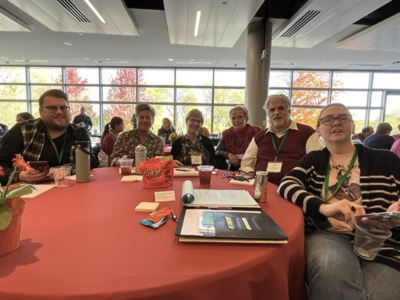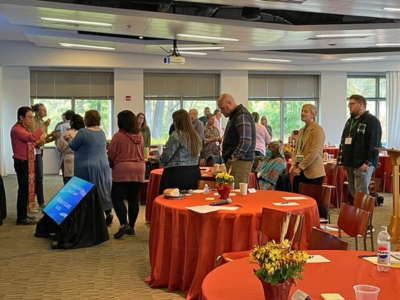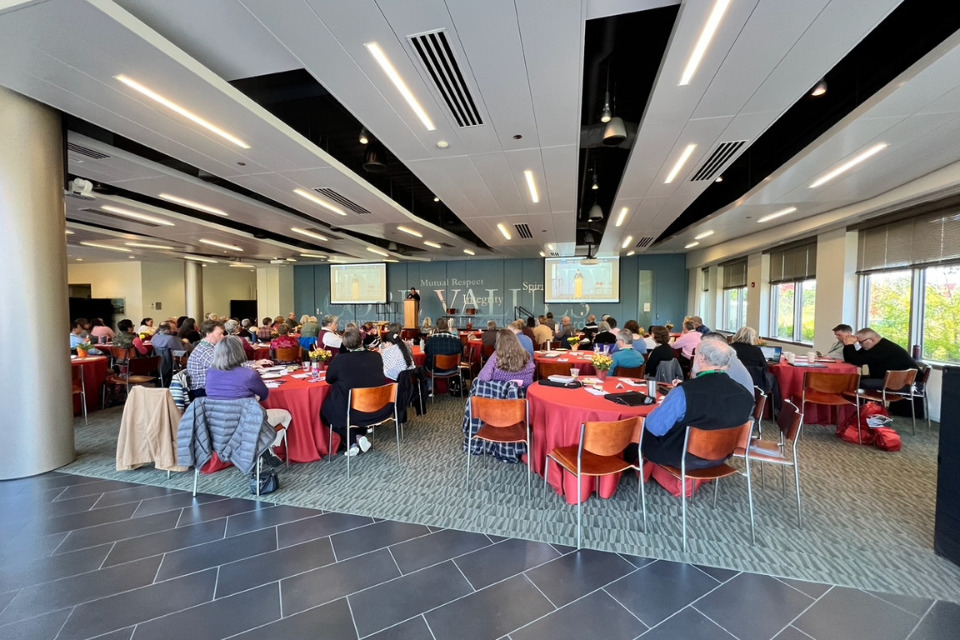Delegations from the North Central Jurisdiction gathered in suburban Chicago to prepare for next year’s General and Jurisdictional Conferences.
REV. CINDY GREGORSON
NCJ Mission Council Member, Minnesota Annual Conference
On October 20-21, 2023, delegations from the North Central Jurisdiction (NCJ) to the upcoming General Conference and Jurisdictional Conference were hosted by Wespath and the North Central Jurisdictional Mission Council. They met at Wespath’s offices in Glenview, IL. Delegates gathered to build relationships, discuss strategy, and learn about key issues that will come before the postponed 2020 General Conference, set for April 23 – May 3, 2024, in Charlotte, NC, and the subsequent North Central Jurisdictional Conference, set for July 10-13, 2024, in Sioux Falls, SD.
Several lay and clergy members of the 16-member Michigan Conference delegation attended in person, with some connecting remotely via Zoom. Michigan is one of the 10 annual conferences within the North Central Jurisdiction spanning from the Dakotas to East Ohio. Initially elected in 2019, the delegates had anticipated participating in the 2020 General Conference, but a string of postponements has delayed it.

Wespath kicked off the presentations by outlining the changes and rationale for the proposed new clergy retirement plan and the commitment to sustainable investment. In welcoming the group, Andy Hendren, General Secretary of Wespath, stated firmly that Wespath is and will always be an agency of The United Methodist Church and that investments will be based on the Social Principles in The Book of Discipline.
The focus of the gathering then shifted to three primary areas: forthcoming legislation related to regionalization (click to learn more), removal of harmful language from The Book of Discipline related to LGBTQIA+ persons, and the future of The United Methodist Church. These topics are directly related to resolutions adopted by NCJ delegates in November 2022 and then affirmed by members of the Michigan Conference at the 2023 Michigan Annual Conference.
The presentation and conversation on worldwide regionalization was led by Rev. Dee Stickley-Miner and Rev. George Howard, who are connected to the Standing Committee on Central Conference Matters.
Rev. Stickley-Miner framed the conversation by asking delegates to reflect on John 3:16-17 and what is required of us to love the world. To see those we may not already see, hear those we may not already hear, and love as God loves the world. To know all people are created in the image of God and that their homes and cultures have already been blessed by God.
Rev. Howard reminded the group that we have been discussing regionalization for 150 years. In 1924, the Board of Missions proposed the United States be a Central Conference. It was defeated. In 1966, 250 people gathered in Green Lake, WI, to discuss the global nature of the church. Since 1996, there have been task forces and proposals to every General Conference on regional conferences and ways to restructure them so the church would not be so US-centric, as well as how to make The Book of Discipline adaptable to other parts of the country.
The legislation and enabling petitions for regionalization being presented by the Standing Committee on Central Conference Matters were grounded in the following values:
-
- Equity
- Decolonizing our mission, relationships, and structure
- Agency – power to make decisions to lead with integrity
- Self-determination within the connectional system
- Stewardship of all gifts
- Decentering the United States
- Unity that is defined and strengthened
- Focus on mission and ministry
- Maintaining our Wesleyan theological doctrine and identity
After a review of the legislation, delegates had an opportunity to listen to five voices from the Central Conferences on their perspective and hope for regionalization. Delegates were asked to name a word, phrase, or image from what they heard. Some of the words and phrases spoken included: stay UMC, all voices heard, regionalization is a gift of hope to uphold inclusivity and unity, making decisions for ourselves, creating more effective plans for our region, will not feel like so much of an intruder or stranger to General Conference, absurd to follow a Book of Discipline based on US government structure and laws, freedom and flexibility for our culture. This was followed by a time of praying for each person who spoke to the delegates.

The second conversation occurred around the dinner table, where the gathering was invited to sit with people they did not know well. Again, through a series of questions and listening to videos of people sharing their perspectives, delegates and Mission Council members were invited to reflect. What is foundational to them about why full inclusion matters? What about removing the restrictive language from church law regarding LGBTQIA+ persons at this General Conference matters to them personally and to us as a church collectively? How can we elevate our voice in sharing that urgency and perspective with others?
The future of The United Methodist Church and strategizing as an NCJ delegation was the focus of the third conversation on Saturday morning. Diane Brown, NCJ Secretary and lay delegate from the Michigan Conference, shared that Bishop Thomas Bickerton, president of the Council of Bishops, has convened a working group to consider the shape of episcopal leadership going forward, given the significant season of transition that we are in, and that the Episcopal Fund is projected to receive a 23.9% cut in the proposed budget from the General Council on Finance and Administration (GCFA). Each jurisdiction is looking at how they would manage with fewer bishops differently. The United Methodist Church currently has 39 US bishops, 25 Central Conference bishops, and five more approved for Africa but not yet filled. Of the 39 US bishops, nine will reach mandatory retirement in 2024, and three more in 2026.
Table groups were invited to discuss their hopes and dreams for the church’s future. Through canvassing of delegations, close to 75 to 79% of delegates are aligned with a more inclusive church. However, that would not reach the 50% majority required to pass legislation. The movements within the United States need to build relationships and support the movements within the Central Conferences committed to staying United Methodist. Dave Nuckols, a lay delegate from Minnesota and a member of the Connectional Table, reminded the group that while the United States will have largely completed disaffiliations in 2023 and is moving on, this is still a very live issue outside the United States, particularly in Africa. The United Methodist Africa Forum, an organization committed to staying United Methodist, seeks to gather people to build unity and coalition in this direction.
The large group time concluded with worship and communion focused on the Becoming BeLoved Community vision of the North Central Jurisdiction. Legislative committee groups convened after lunch to discuss relationship-building ideas across delegations within the jurisdiction.
James Deaton contributed to this jurisdictional report, which was edited for clarity and length.
Last Updated on November 15, 2023

